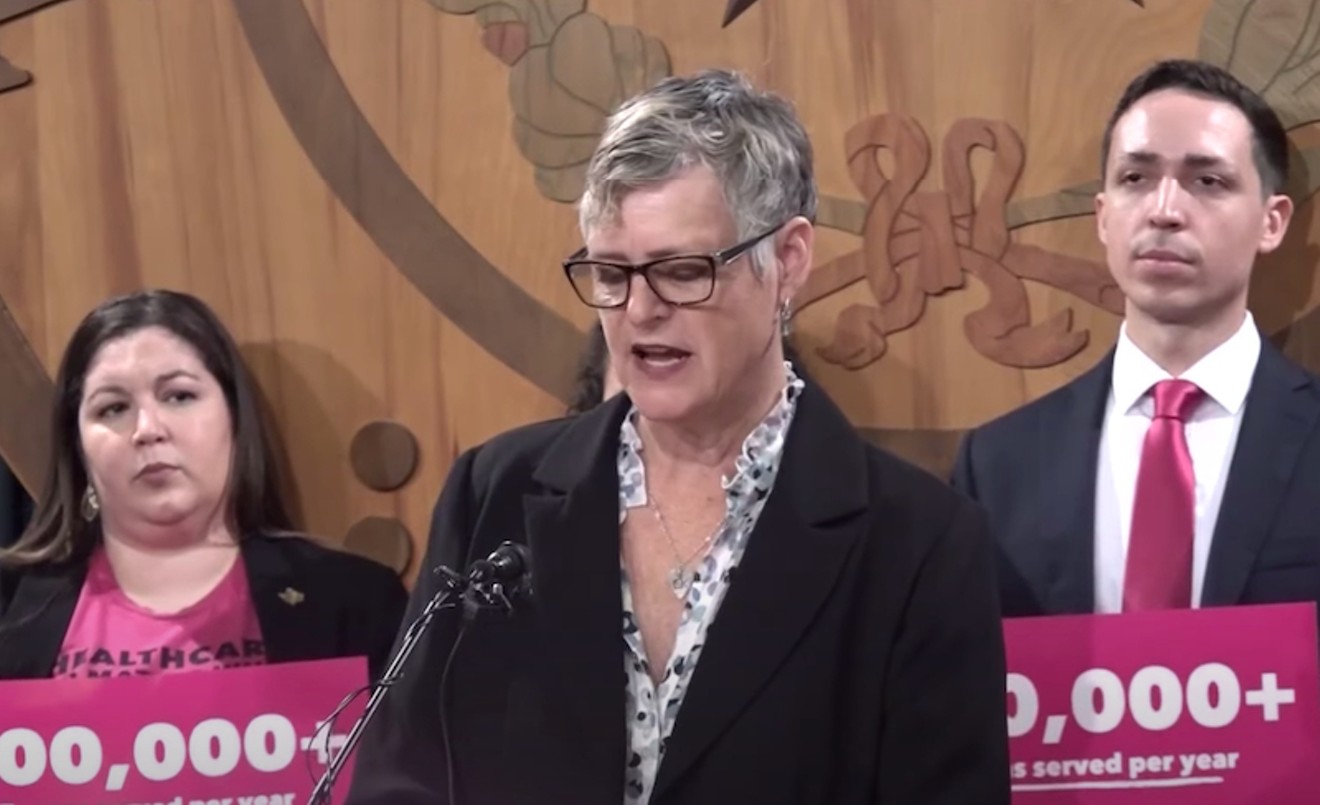Abortion aside, groups like Planned Parenthood are hoping that new legislation filed in both the Texas House and Senate will restore their access to federal and state funding that was removed from them by a series of acts by the Texas Legislature.
“Abortion has been decimated in Texas and that is not what this bill is about,” said Wendy Davis, Senior Advisor for Planned Parenthood Texas Votes. “This bill is about reproductive health services, cancer screens, STI screens and other important health care that so many people across our state are doing without and that we are seeing devastating human and health consequences as a result.”
Restrictions in federal and state funding caused clinics and other facilities to either completely cease operations or limit the healthcare provided by their organizations, said State Senator Sarah Eckhardt who held a press conference at the State Capitol this week.
She was joined by members of Planned Parenthood Texas Votes who called for the Texas Legislature to approve the passage of the Comprehensive Access to Reproductive Health Entities or the C.A.R.E No Matter What Act and repeal the past actions of the Texas Legislature.
Filed in both the House and the Senate, under SB1314 and HB3606, if passed this legislation would allow reproductive healthcare clinics and other family planning organizations to receive federal and state funding again.
Many women, particularly Medicaid patients, have trouble receiving basic health services formerly provided by Planned Parenthood and other family planning groups removed from the approved list for funds over the years.
According to Eckhardt, of the state’s more than 80 clinics, a third were Planned Parenthood facilities located in different parts of Texas. Because of these closures, nearly 45,000 fewer Texans were able to seek the care they needed, she said.
According to Drucilla Tigner, Co-Executive Director of Planned Parenthood Texas Votes, starting in the 2011 legislative session, legislators voted to remove Planned Parenthood from the breast and cervical screen program, the AIDS program and the Medicaid women’s health program.
Then in 2016, Attorney General Ken Paxton and the Office of the Texas Health and Human Services Inspector General announced that Planned Parenthood would be removed from the Texas Medicaid program, according to a press release from the Office of Attorney General Ken Paxton.
“While Medicaid in 2016 was a big moment, it didn’t end there. They continued to remove Planned Parenthood from a lot of different programs within the state,” Tigner said. “They removed Planned Parenthood from Title X funding, then in 2019 passed Senate Bill 22, which prevented local governments from supporting the organization and other providers.”
Though restrictions continued, the access to Medicaid funding in 2016 launched the organization in a five year-long litigation process with the state.
In 2020, The U.S. Court of Appeals ruled in favor of the state and terminated Planned Parenthood from the Texas Medicaid Program, which was made official after a grace-period in 2021, said Tigner.
Prior to the state cutting Texas Medicaid funding to Planned Parenthood, the reproductive health clinics serviced around 8,000 Medicaid patients. However, the 2021 ruling, Planned Parenthood has been unable to provide any care to these patients.
“Because of these politically motivated attacks, Planned Parenthood and similar organizations are limited to providing low-cost, high-quality care to the Texans who need it,” Tigner said.
Funding restrictions like these disproportionately impact communities based on their locations, leaving them with little to no access to affordable care.
“As a result of these restrictions, a lot of clinics had to close in places like Midland, Odessa, Lubbock and Abilene, where there is already low access to care in these more rural areas that are not near major metropolitan areas,” Tigner said.
“Patients may not even be able to find a provider that takes Medicaid because of the overall shortage and the fact that fewer and fewer providers every single year are taking Medicaid because of reimbursement rates,” said Tigner.
These clinic closures also impact the higher-than-average populations of people who do not have health insurance in the state.
According to the Texas Comptroller’s 2019 data, 18.4 percent of Texans do not have health insurance. The state also has one of the highest rates of reproductive-aged women who are uninsured with 26.3 percent, as indicated data from the 2019 Texas Census.
Though the termination of Medicaid was made official, Tigner said that this legal fight is far from over for Texas lawmakers.
“Now, there is this case out of Amarillo from the state alleging that Planned Parenthood shouldn’t have provided care to Medicaid patients and received reimbursements,” Tigner said. “The state is claiming fraud, which is completely ridiculous, this lawsuit is just another way to harass Planned Parenthood and try to shut it down in Texas and nationwide.”
Heather Allison, communications and public policy associate for Fund Texas Choice said now that the state’s funding restrictions caused clinics to close, they are going after entire organizations.
“A big reason why the Texas Legislature is going after organizations like this, is because they’ve already forced most of the healthcare facilities to stop operating, so now all that’s left are the organizations behind them,” Allison said. “I also think they think any type of access to this care is now a crime, that they need to stop.”
The lawsuit, which is ongoing, states that Planned Parenthood should return $1.8 billion in funds, said Tigner.
“These funding restrictions have never been about anything other than politicians in Texas wanting to control the bodies of the people in the state and limit their ability to choose their future for themselves and their families,” Tigner said. “It is unclear what will happen in the Legislature, but hopefully something changes.”
Support Us
Houston's independent source of
local news and culture
account
- Welcome,
Insider - Login
- My Account
- My Newsletters
- Contribute
- Contact Us
- Sign out
Planned Parenthood Texas Hopes To Regain Access to State and Federal Funding
Faith Bugenhagen March 8, 2023 4:30AM

State Senator Sarah Eckhardt authored Senate Bill 1314 to reinstate federal and state funding to reproductive healthcare and family planning facilities.
Screenshot
[
{
"name": "Related Stories / Support Us Combo",
"component": "11591218",
"insertPoint": "4",
"requiredCountToDisplay": "4"
},{
"name": "Air - Billboard - Inline Content",
"component": "11591214",
"insertPoint": "2/3",
"requiredCountToDisplay": "7"
},{
"name": "R1 - Beta - Mobile Only",
"component": "12287027",
"insertPoint": "8",
"requiredCountToDisplay": "8"
},{
"name": "Air - MediumRectangle - Inline Content - Mobile Display Size 2",
"component": "11591215",
"insertPoint": "12",
"requiredCountToDisplay": "12"
},{
"name": "Air - MediumRectangle - Inline Content - Mobile Display Size 2",
"component": "11591215",
"insertPoint": "4th",
"startingPoint": "16",
"requiredCountToDisplay": "12"
}
]
KEEP THE HOUSTON PRESS FREE...
Since we started the Houston Press, it has been defined as the free, independent voice of Houston, and we'd like to keep it that way. With local media under siege, it's more important than ever for us to rally support behind funding our local journalism. You can help by participating in our "I Support" program, allowing us to keep offering readers access to our incisive coverage of local news, food and culture with no paywalls.
Trending News
- Former Katy ISD Trustees Band Together To Support Two Trustees Running For Re-Election
- Column: Opting Out of the STAAR Test Requires a Law Degree Or Iron Will
- Four Reasons the Astros Are Bad at Baseball Right Now
-
Sponsored Content From: [%sponsoredBy%]
[%title%]

Don't Miss Out
SIGN UP for the latest
news, free stuff and more!
Become a member to support the independent voice of Houston
and help keep the future of the Houston Press FREE
Use of this website constitutes acceptance of our
terms of use,
our cookies policy, and our
privacy policy
The Houston Press may earn a portion of sales from products & services purchased through links on our site from our
affiliate partners.
©2024
Houston Press, LP. All rights reserved.





